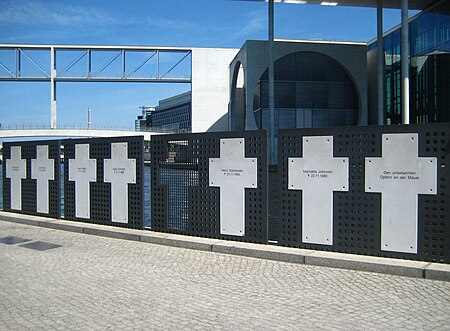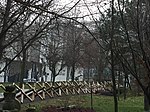White Crosses

White Crosses (in German: Weiße Kreuze) is a memorial for those who died during the Cold War at the Berlin Wall. It is located at the shore of the river Spree in Berlin next to the Reichstag building, which houses the German parliament. Established by the private group Berliner Bürger-Verein on the 10th anniversary of the Berlin Wall in 1971 it was first located east of the Reichstag on a fence directly in front of the wall. After the German reunification in 1990 it kept its location until construction of the new government buildings next to the Reichstag was started at the end of that century – Berlin was chosen to be the new capital of Germany.During construction the memorial was moved to a location south of the Reichstag next to the Tiergarten. On the 50th anniversary of the Uprising of 1953 in East Germany a second set of crosses was erected on the riverbank, which is slightly north-west of the original location. The opening speech was given by then President of the Bundestag Wolfgang Thierse.
Excerpt from the Wikipedia article White Crosses (License: CC BY-SA 3.0, Authors, Images).White Crosses
Friedrich-Ebert-Platz, Berlin Mitte
Geographical coordinates (GPS) Address External links Nearby Places Show on map
Geographical coordinates (GPS)
| Latitude | Longitude |
|---|---|
| N 52.519635 ° | E 13.376831 ° |
Address
Weiße Kreuze
Friedrich-Ebert-Platz
10117 Berlin, Mitte
Germany
Open on Google Maps











